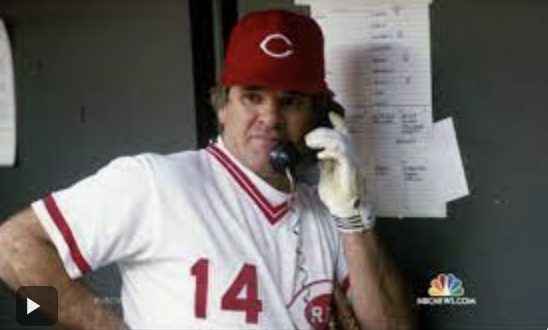Pete Rose must be literally wetting himself with excitement.
Back in his heyday, he had to deal with bookies to make illegal bets on sports. You could bet on who would win and perhaps on the over/under when it came to scoring, but mostly, that was it.

Before the Internet.
Before smartphones.
Before, well, before America went berserk with people trying to get money without having to work for it.
It’s hard to believe, but it wasn’t all that long ago that the only legalized gambling in the United State was betting on animals to run faster and/or jump higher than other animals. Then in 1931, Nevada legalized all sorts of casino and card game, with the idea of raising money during the Great Depression.
In 1934, Puerto Rico became the first American jurisdiction to start a lottery, In 1964, New Hampshire started the first stae lottery.
Now there are only five states without lotteries — Alabama, Alaska, Hawaii, Nevada and Utah. Nevada is the outlier here, since the Silver State has every other form of gambling imaginable, including slot machines at the checkout lines in grocery stores.
Only Hawaii and Utah have no forms of legal gambling at all, although Utahns with the desire to gamble can hit casinos and sports books in West Wendover, Nevada, just 123 miles west on I-80.
Of course, that’s doing it the hard way.
These days, a smartphone and a credit card are pretty much all you need to be a gambler anywhere you can access the Internet.
In fact, where lifetime-banned Rose might feel really mistreated is that now baseball is encouraging people to make or games or things happening during games while they’re watching the games.
Odds and wagers even change as the game progresses. I was watching a game last week where the over/under on how many runs would be scored was 7.5. Going into the seventh inning, the score was 3-0. A revised over/under bet at that point was 4.5. In addition, odds were offered on whether each upcoming batter would get a hit.
When you consider gamblers who think the next bet will always get them even or ahead, it’s easy to imagine someone losing as many as 10-12 bets during one ballgame.

You can imagine someone like Rose making decisions on whether to send up this or that pinch-hitter based on the odds on him getting a hit.
For 18 months at the end of the 1980s, I lived in a state and city that was all about gambling. Oddly, even though my jobs was covering sports and I probably knew more than the average person, I never gambled on a sports event the entire time I lived in Reno.

That’s not to say I didn’t gamble. I spent a lot of time playing video poker in casinos, and I’m pretty sure I roughly broke even, losing $40-80 a lot of the time but winning four $1,000 jackpots.
In fact, just about the only gambling I did was horse-race betting in Maryland in the ’70s and Sunday night poker games in St. Louis in the mid ’80s. I was good at one, not so good at the other.
One thing I knew then and know now, if you gamble long enough, you nearly always lose.
That’s one reason people call lotteries and othe gambling the Stupidity Tax.
Hey, just ask Pete.
